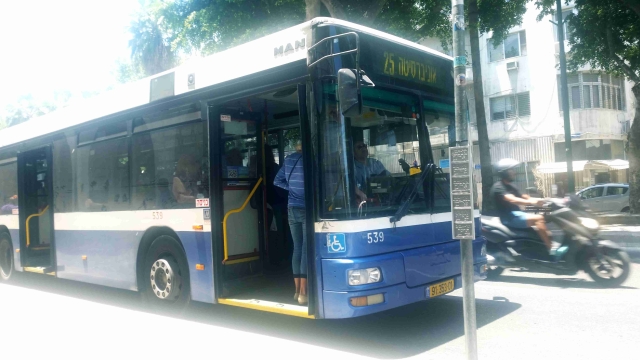The government approved a proposal by Transportation Secretary Meirav Michaeli, to establish Metropolitan Transportation Authorities, which would lift the responsibility from Israel's central government. One of the purposes of this dramatic shift is that local municipalities will be able to decide whether or not to operate public transportation on the Sabbath, an issue of much debate in Israeli society.
The government unanimously approved MK Meirav Michaeli’s proposal to establish regional authorities for transportation. The issue that lies ahead is where it gets complex. Since these are metropolitan authorities, in which several nearby authorities will be partners, it is likely that at least one city will oppose the operation of public transportation on Saturday. For example, in the general area of Tel-Aviv called Gush Dan, the municipality of ultra-orthodox Bnei Brak is expected to refuse to join a metropolitan authority that will promote public transportation on Saturday.
Local authorities will decide whether #publictransport will run on Shabbat after the government on Sunday approved a multi-year plan to establish regional authorities for transportation.https://t.co/KKZ1BUstGc
— CJP Israel 🇮🇱 (@CJPIsrael) September 12, 2022
The non-joining of Bnei Brak will be a serious obstacle for the potential regional transportation authority, since many bus lines pass through the city connecting the cities of Gush Dan, and without cooperation from all areas inside the region, it will not be possible to manage public transportation even on weekdays. According to the proposal approved by the government, each local authority will be associated with a transportation space without exception. All transportation areas will manage the transportation and traffic in the area based on powers and roles that the Ministry of Transportation and the authorities will transfer to them.
#Israel: Should the Tel Aviv light rail run on #Shabbat?
— i24NEWS English (@i24NEWS_EN) September 10, 2022
"The current situation is simply arbitrary. Why can the 845 bus line leave Kiryat Shmona on Saturday afternoons? What makes this line unique?"https://t.co/5uYa77Gwxh
In the first phase of this plan, the regional transportation authorities will serve as the local traffic sign authority, spearhead the development of plans for public transportation, and plan and implement joint transportation projects with the regional authority as part of a broader representative council for all the authorities in the region. Later phases in the legislation will see the authorities given extensive powers to advertise and operate public transportation tenders, fare enforcement, and other responsibilities that typically lie with the Transportation Ministry.
MK Michaeli most recently made headlines by calling for the new light rail in Tel-Aviv to run on Saturday, since the majority of the city’s residents are secular and would benefit from it. This was met with staunch objection from the Ultra-Orthodox sects who believe that as a Jewish-run country, the sabbath should be respected in all parts of the country, regardless of demographics. Currently, cities with large Arab populations such as Haifa have public transportation on Saturdays, while areas with large secular populations have private bus services known as 'sheruts.' Israel Railways ceases operation just before the onset of the Sabbath Friday afternoon and resumes service one hour after it ends on Saturday night. It is expected that the new Jerusalem to Ben Gurion Airport train, which is set to start running 24 hours a day, will eventually have limited hours on Saturday.
1/3 Afula: A city in northern Israel in yet another clear display of racism: The City Council is advancing a ban on driving lessons on Saturdays and Jewish holidays explicitly aimed at keeping Palestinian citizens of Israel out of Afula. https://t.co/Oq1vM24Tsz pic.twitter.com/dZNXwzFYud
— Adalah (@AdalahEnglish) July 20, 2022
Director General of the Ministry of Transportation and Road Safety, Michal Frank said: "For the first time, we succeeded in formulating a gradual implementation model, which allows the Minister of Transportation to immediately establish - and without legislative changes - regional authorities and authorize them in a variety of fields. Later we will promote legislation and the territoriality of the powers. This is a real revolution that supports our view that transportation should be managed from the ground, in accordance with local and spatial needs."


